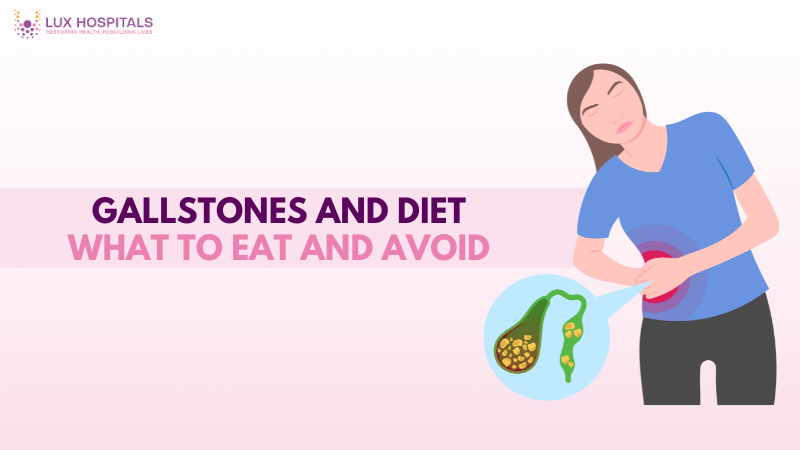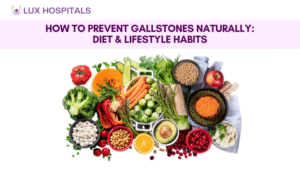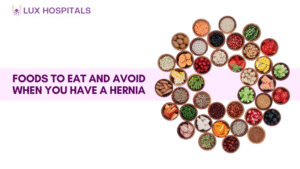Managing Gallstones with Diet: What You Should Eat

Gallstones are hardened deposits that form in the gallbladder, often causing pain, nausea, and digestive issues. While medical treatment may be necessary in some cases, the relationship between gallstones and diet is particularly significant, as what you eat plays a vital role in managing symptoms and preventing new stones. Adopting the proper dietary habits can reduce gallbladder stress, support better digestion, and minimize flare-ups. This blog explores in detail the best foods to eat, what to avoid, and how to plan a gallbladder-friendly meal plan.
Understanding the Connection Between Gallstones and Diet
The gallbladder stores bile, which aids in the digestion of fats. When bile becomes imbalanced too much cholesterol or bilirubin it can lead to the formation of stones. Poor dietary habits, such as consuming fatty or processed foods, can worsen this imbalance. Therefore, gallstones and diet are closely linked, as making mindful food choices can help alleviate gallbladder strain and support overall digestive health.
Foods to Eat for Gallstones and Diet Management
Choosing the right foods can promote gallbladder health and reduce inflammation. A balanced diet focusing on fiber, lean proteins, and healthy fats can make a significant difference.
- High-fiber foods: Whole grains, oats, lentils, beans, and vegetables help improve digestion and prevent bile imbalance.
- Lean proteins: Skinless chicken, fish, tofu, and legumes support muscle health without straining the gallbladder.
- Healthy fats: Small amounts of olive oil, flaxseeds, and avocados can aid bile flow and reduce gallbladder stress.
- Fruits and vegetables: Fresh produce like apples, berries, spinach, and broccoli is rich in vitamins and antioxidants.
By following these recommendations, you can make sure that your food and gallstones cooperate to keep your gallbladder healthy and promote easier digestion.
Foods to Avoid for Gallstones and Diet
Certain foods can trigger gallstone symptoms or increase the risk of developing new stones. Limiting or avoiding these can significantly reduce discomfort.
- High-fat foods, such as fried items, processed meats, and full-fat dairy, increase cholesterol in bile.
- White bread, sugary snacks, and processed foods are examples of refined carbs. grains can disrupt digestion.
- Red meat and heavy dairy are harder to digest and may lead to gallbladder inflammation.
- Sugary beverages and alcohol can aggravate gallbladder issues and increase bile imbalance.
In order to reduce pain episodes and promote gallbladder recovery, it is imperative to avoid these foods when managing gallstones and diet.
Importance of Portion Control in Gallstones and Diet
Overeating can strain the gallbladder and trigger painful symptoms. Gallbladder burden can be decreased by eating smaller, more frequent meals rather than larger ones. Additionally, this method promotes improved bile flow, avoiding the stagnation that causes gallstones to form. Gallstones and meal planning that incorporates portion control assist in managing symptoms and providing consistent energy levels throughout the day.
Role of Hydration in Gallstones and Diet
Maintaining proper bile production and digestion requires drinking plenty of water. By maintaining bile consistency, drinking enough water lowers the chance of stone formation. Clear broths and herbal teas can help you stay hydrated and aid in digestion. It is strongly advised to aim for at least 8 to 10 glasses of water every day for people who are managing gallstones and their diet.
Planning a Gallbladder-Friendly Meal
It’s essential to concentrate on balance and simplicity when creating a diet and food plan for gallstones. Here’s an illustration.
- Breakfast: Oatmeal with berries and chia seeds.
- Lunch: Grilled chicken with quinoa and steamed vegetables.
- Snack: Apple slices with almond butter.
- Dinner: Baked fish with brown rice and sautéed greens.
These meals are low in unhealthy fats. They are easy to digest and high in nutrients, which makes them perfect for people with gallbladder problems.
Lifestyle Changes to Support Gallstones and Diet
Dietary changes work best when combined with lifestyle modifications. Gallstone risk is decreased by maintaining a healthy weight through regular exercise. Digestive health can also be enhanced by stress-reduction techniques like yoga or meditation. Combining these activities with a diet and gallstone prevention plan offers a comprehensive strategy for preventing problems.
Conclusion
Managing gallstones and diet requires a mindful approach to food choices, portion control, and hydration. Eating a high-fiber, low-fat diet while avoiding processed and greasy foods can significantly reduce symptoms and improve gallbladder health. Combined with lifestyle changes such as regular exercise and stress management, a proper diet can make living with gallstones more manageable. By understanding what to eat and what to avoid, you can take control of your digestive health and prevent future complications.
Frequently Asked Questions
Whole grains, fruits, and vegetables are examples of diets high in fiber that can improve bile flow and support gallbladder health. Moderate use of healthy fats, such as olive oil, may also be beneficial. Diet can reduce symptoms and stop new stones from forming, but it may not be enough to dissolve existing ones.
Eggs are high in cholesterol, which can aggravate gallstone issues for some people. However, egg whites are a safer option, as they contain protein without the added fat and cholesterol. Including eggs in moderation as part of a balanced diet plan may be acceptable.
Rapid weight loss can increase the risk of gallstone formation, as it causes bile imbalance. Gradual, steady weight management through healthy eating and exercise is safer. Maintaining a healthy weight is a key part of managing gallstones and diet effectively.
For those who have gallstones, low-fat or fat-free dairy products are usually safe. Low-fat or fat-free dairy options are generally safe for people with gallstones. Full-fat dairy can increase cholesterol in bile, worsening gallstone symptoms. Choosing low-fat yoghurt, milk, and cheese supports a healthier diet.
Nuts are high in healthy fats, which can benefit overall digestion when eaten in moderation. However, large quantities may trigger gallbladder discomfort in some people. Including small portions of unsalted nuts in a balanced gallstone diet plan can provide nutrients without overloading the gallbladder.
Moderate coffee consumption may lower the risk of gallstone formation due to its stimulating effect on bile flow. However, excessive caffeine intake can cause digestive issues in some individuals. It’s best to consume coffee in moderation as part of a well-balanced gallstone diet.




















